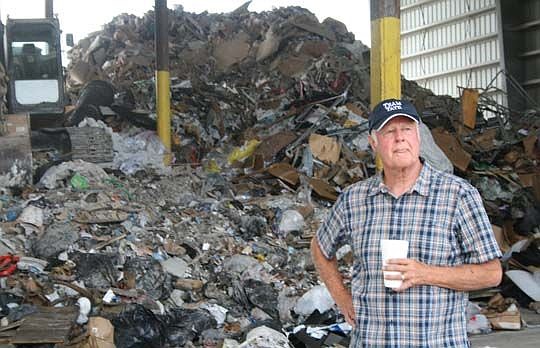
City Council member Bill Gulliford said something stinks about the way construction and demolition debris hauling is regulated by local government.
Gulliford maintains the city’s landfill fee structure, along with what he says is the state government’s refusal to enforce its own rules, directly contributed to a large recycler’s recent closure.
And he aims for city government to do something differently; perhaps requiring construction debris haulers to pay nonexclusive franchise fees. Or not.
The franchise fee amount, among many other issues associated with Gulliford’s idea, has not been contemplated.
“At this point, I’m just saying it’s worth a look,” said Gulliford, the council’s District 13 representative and Solid Waste Special Committee chair.
Gulliford put the idea on the table at a September committee meeting and asked city staffers to gather information to help council determine its merit.
The committee has met twice since without coming to a conclusion.
St. Johns, Clay and Nassau counties require construction and demolition debris (C&DD) haulers to pay nonexclusive franchise fees, which effectively gives the haulers a license to do business in those counties.
Jacksonville has no such requirement. Instead, the city imposes a $7.16-per-ton “host fee” on top of tonnage-based tipping fees for construction debris discarded at Jacksonville’s landfills.
In turn, depending on where the debris is collected, many haulers are choosing to take it to landfills in neighboring counties, thus avoiding Jacksonville’s host fee.
“There’s a certain amount of (C&DD) volume going out of the county and we are entitled to that revenue stream,” Gulliford said.
The issue of regulating construction debris is especially impactful in Jacksonville because of the city’s size and growth, which generates a rising tide of scrap, discarded and waste materials.
It’s also complicated.
“I’m still trying to wrap my brain around it, myself,” said council member Jim Love.
Gulliford said he envisions nonexclusive fees — which means hauling isn’t limited to a certain number of firms — having a neutral impact on haulers and their customers.
As such, Gulliford asked city staff members to attempt to qualify the amount of C&DD disposed in the city’s Trail Ridge Landfill and estimate the franchise fee that would be needed to offset the host fee. The city’s Public Works Department estimated it at 14 percent.
Clay County charges a 14 percent franchise fee and St. Johns County’s is 10 percent.
Solid Waste Special Committee member Matt Schellenberg, for one, says he can’t imagine that being an outcome of imposing franchise fees.
“I don’t believe there’s a corresponding relief on the other side,” said Schellenberg, who represents District 6. “Unfortunately, in my opinion, it’s just another way to get more money.”
Love, a committee member who represents District 14, says he thinks it’s worth being studied.
“I haven’t made up my mind yet on where I stand. There’s so much to learn, yet,” he said.
Meanwhile, the Northeast Florida Builders Association is monitoring the discussion with interest.
If the franchise fee idea gains traction, it’s likely NEFBA will take a position on behalf of its membership, said Jessie Spradley, the trade organization’s government affairs director.
“Whether it’s good for NEFBA’s members, depends on how it’s implemented,” Spradley said. “Obviously, if it’s an issue affecting the construction industry, we’ll be watching.”
During the September committee meeting, Gulliford broached the saga of Coastal Recycling Services, which shut down its recycling operation –– the pillar of its business — at the end of 2014.
The company opened in 2011 as a full-service, mixed C&DD recycling facility.
Coastal Senior Partner Joe Tate says the firm’s business model — and $8 million to $10 million capital investment — was largely based on a state requirement that recoverable C&DD be processed at a recycling facility, if doing so is economically feasible.
But in many areas of Florida, including Jacksonville, the state’s recycling mandate isn’t enforced. That’s because of the role landfill economics play in determining whether C&DD debris recycling is feasible.
Jacksonville’s code requires the C&DD host fee to be collected at every solid waste disposal or management facility.
Administered by the city Solid Waste and Resource Management Department, the host fees fund landfill contamination assessment and remediation, along with landfill closure and mitigation programs.
When the city informed Coastal that the company had to begin paying the host fee on Jan. 1, 2015, Tate said, “It put us out of business.”
Coastal has since sold the multimillion-dollar recycling component of its Blasius Road facility on the Northside.
The business recently reopened as a modest C&DD transfer facility. Tate says Coastal once had 25 employees and now has five.
Tate and Gulliford say state government could and should do more to ensure recyclable material isn’t recovered and conserved.
“It’s a real tragedy all the way around, from our standpoint as investors in a business and because we could be taking better care of the earth,” Tate said.